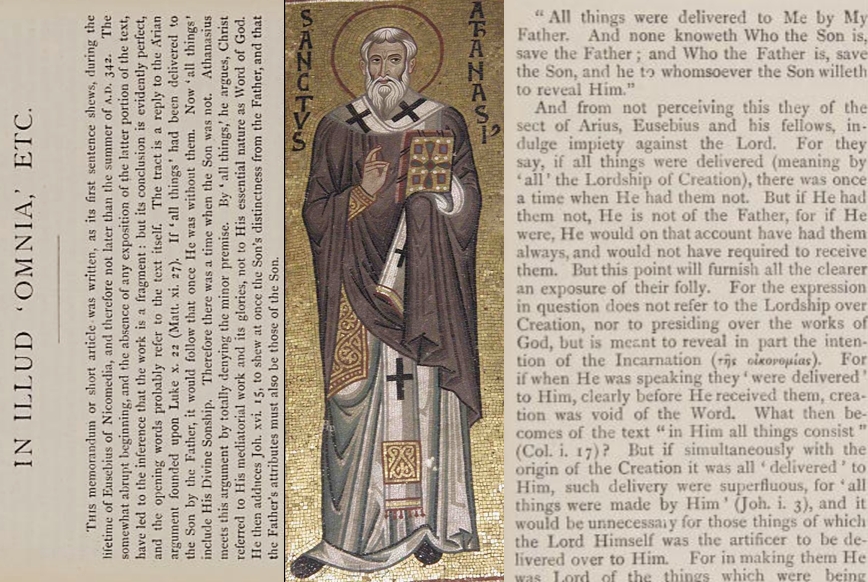A scene from The Canterbury Psalter (12th century)
Blog
What the Son Has From the Father

Athanasius’ In Illud Omnia is fantastic. Too bad it got stuck w/no context & a non-title. Personally, I refer to it as “What the Son Has from the Father.” Here’s a thread on what I saw as I worked through it recently.
It’s just about 2k words long; may have been a sermon; may be from 342. There’s a wooden ET in NPNF2, 4:87-90 by Newman and/or Robertson; Greek in PG 25:208-20.
Athanasius starts by reading Matt. 11:27, “All things have been given over to me by my Father,” & then takes up the question of what the Son receives from the Father.
Arians might pounce on the text as proof that the Son used to lack all things, but that once upon a time the Father gave them over to him. They take it as a kind of origin story of how the Son started being & being himself, after a phase during which he was not yet.
Athanasius says that Jesus’ words here are intended to direct our attention the incarnate work,τῆς οἰκονομίας. A lot depends on what you think “all things” means. Ath says it means the whole project of salvation, but it doesn’t mean divinity or lordship of creation.
Ath. treats “given over” as language about the economy, and proves it thus: 1. All things are given over to me. 2. Come to me, I will give you rest. In context, Jesus is announcing that salvation is in his hands, and then offering the invitation.
Sect. 2 of In Illud Omnia includes a thumbnail sketch of the economy in which the Father asks “Whom shall I send” and the Son answers “Here am I, send me.” It’s a dramatic underlining of the fact that the mission (“Go thou”) is the “giving over” of humanity to the Son.
By treating “given over” as having specifically oikonomia significance, Athanasius opens up a wide field for soteriology. He whips through incarnation & atonement deftly: the healing of human nature, the vicarious punishment of sin, all narrated & explained.
Having requisitioned “given over” for economy, Ath. now needs words for what the Son has from the Father by nature. In sect. 3, he admires Jesus’ “exactness of language” & “expressions which could not be improved.” Jesus says “all things the Father has are mine.” (John 16:15)
Basically, Ath uses a distinction here between (A)”what the Father has” w/the Son, & (B)”what the Father hands over” to the Son. The former is eternal generation, the latter is economy of salvation. It’s a verb-of-being vs. verb-of-action insight. But both are from Father to Son.
It’s having vs. handing-over. Even if it’s ad hoc for this task, I think it’s an excellent & helpful distinction. And while I haven’t tested it carefully exegetically, I low-key think it might actually track with biblical usage. Trinitarian survey of paradidomai, anyone?
He insists on this: Jesus didn’t say “has given me,” but “are mine.” [Ath admits that John 5:26 says “he gave [ἔδωκε] to the Son also to have life in Himself.” But he thinks “gave” occurs in that text merely to point to the character of the Father.]
As he devotes some more attention to eternal generation, Athanasius says “in the Father reside Everlastingness, Eternity, Immortality. Now these reside in Him as in a well-spring; they reside in Him, and in the Son.” They must be in the Son if he is truly the Image.
So the Son has all that the Father has according to their same divine nature, but in the mission of incarnation the Son receives what the Father gives over to him: “all things” for us and our salvation.
Well, I left out some of the best stuff, but I think this is a good peek into Athanasius’ short (did I mention it’s only about two thousand words?) piece on what the Son has from the Father.
About This Blog

Fred Sanders is a theologian who tried to specialize in the doctrine of the Trinity, but found that everything in Christian life and thought is connected to the triune God.


